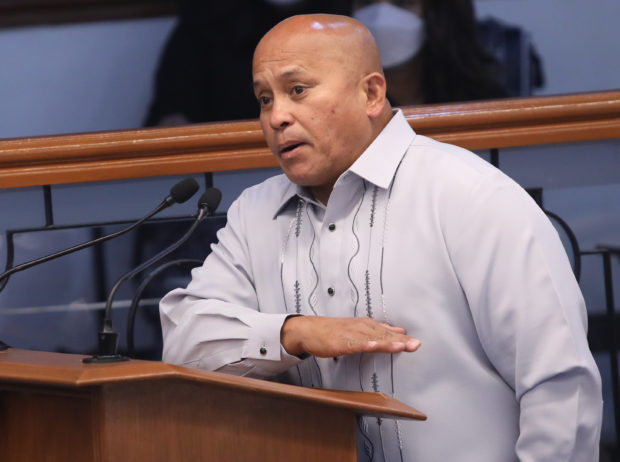PNP mulls revival of Oplan Tokhang

Sen. Ronald “Bato” Del Rosa (File photo from the Senate Public Relations and Information Bureau)
MANILA, Philippines — The Philippine National Police is considering whether or not to revive its controversial Oplan Tokhang strategy in combating illegal drugs as suggested by its former chief, now Sen. Ronald “Bato” dela Rosa.
But should there be a revival, Col. Jean Fajardo, spokesperson for the PNP, said on Tuesday there would be “better checks and balances with the help of barangay drug-abuse councils to make sure it would not be used by police officers for abuse.”
President Ferdinand Marcos Jr. earlier vowed to continue the war on drugs but “with respect for human rights and with focus on rehabilitation and socio-economic development.”
According to Fajardo, a revived Oplan Tokhang would still be “aligned” with the current administration’s focus on rehabilitating drug users.
“If this will be revived, it will open doors for more families who have no capacity to bring their drug-dependent members to rehabilitation centers,” she said.
Article continues after this advertisementOplan Tokhang was the first component of the PNP’s Oplan Double Barrel, the blueprint of the war on illegal drugs waged by the previous administration. It targeted the surrender of small-time drug dealers, while Oplan High-Value Target went for the so-called “big fish.”
Article continues after this advertisementGained notoriety
Tokhang, coined from the Visayan word “toktok” (knock) and “hangyo” (persuade), directed lawmen to seek out illegal drug traders and persuade them to quit criminal activities.
But it gained notoriety for resulting in the death of thousands of drug personalities, mostly from poor communities, who supposedly resisted arrest.
Oplan Tokhang was suspended twice, in January and October 2017, after then-President Rodrigo Duterte ordered the Philippine Drug Enforcement Agency to take sole charge of conducting drug operations. The campaign was relaunched in December 2017, with the PNP implementing new rules such as Tokhang visits to be conducted only between 8 a.m. and 5 p.m. on weekends.
6,200 killed
Duterte’s war on drugs claimed the lives of more than 6,200 people in legitimate police operations. But rights groups estimated the death toll at around 30,000 by 2019 if drug suspects gunned down by unidentified suspects and vigilantes were also included.
In an interview on ANC on Monday, Dela Rosa asked the PNP to “consider” bringing back Oplan Tokhang “if possible.”
“[It] was very successful. Our crime volume went down to almost 50 percent because of Oplan Tokhang. We have waged war against drugs in the first place to make our communities safe, and we achieved a lot,” he said.
Dela Rosa claimed the strategy employed when he was PNP chief was “very effective” in reducing demand for drugs, and it resulted in 1.6 million surrenders and the arrest of 300,000 drug offenders.
While he acknowledged the thousands of deaths under the campaign, he said these were caused by “different circumstances,” including reported abuse by some police officers.
In March, the PNP launched the “finale” of Double Barrel, calling it Oplan Adore or “Anti-Illegal Drugs Operation through Reinforcement Education.”
Adore, which is still being implemented by the PNP, calls for a “wholistic approach” to strengthen the campaign against illegal drugs in communities by rehabilitating drug users and through information and education campaigns.